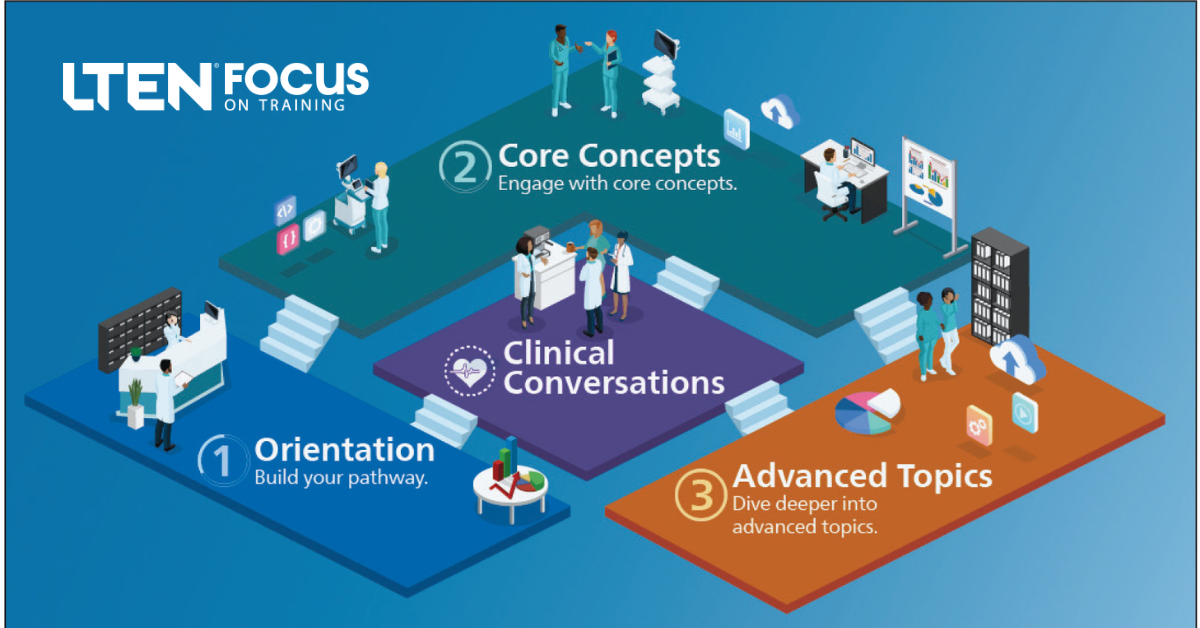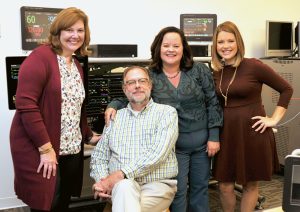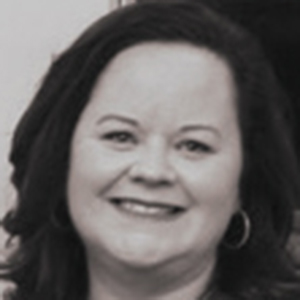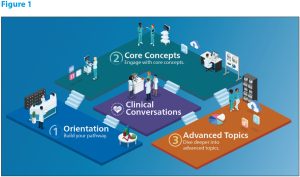
Cover Story – By Jennifer Bertram
An award-winning solution for critical care teams

The Philips patient monitoring clinical learning journeys leadership team included, from left to right, Jenny Johnson, field clinical applications director; Pete Stribling, national clinical consultant; Jennifer Bertram, education and training innovation leader; and Lauren Whitehurst, senior clinical solutions implementation consultant.
Critical care teams are facing challenges today like no other time. According to Health Affairs, the total supply of registered nurses decreased by100,000 between 2020 and 2021, with many of those leaving under the age of35 and employed in hospitals. Additionally, in 2022, the American Nurses Foundation found 52% of all nurses considered leaving their current position, with 75% of those nurses reporting feeling stressed, frustrated and exhausted.
What can a patient monitoring organization do in the face of this reality? Ensure that learning new technology makes a clinical team’s job easier, not harder. The Philips patient monitoring clinical education team is committed to doing just that — supporting customers through these staffing challenges, as well as preparing them to use the next generation monitoring solutions in the most flexible and efficient methods possible.
Beginning in 2021 and triggered by evolving customer needs during the COVID-19pandemic, Philips patient monitoring evolved its approach for delivering customer education to a more blended learning experience called clinical learning journeys that provides flexible personalized and relevant education for clinical staff. Not only does this innovative user-centric approach better support customers, but it also enables Philips to scale its clinical services in a more flexible way.
With its consulting partner, TiER1 Performance, Philips was recognized for its innovative work at the 2023 LTEN annual conference, winning the LTEN Excellence Award for QRDM (Quality, Research, Development and Medical) Training Innovation, Impact & Efficiency.
The Challenge
The pandemic altered Philips’ learner audience. Clinicians left en masse, leading to less experienced nurses being staffed in higher acuity care areas. The pace of turnover amplified the need for Philips to improve speed to proficiency and supportless experienced users in new ways.
At the same time, customers called for more flexibility in their education, needing to be able to consume education when and where it’s convenient. Together, these challenges prompted Philips to explore alternative methods for delivering education that would increase accessibility and decrease time to proficiency while not sacrificing consistency, effectiveness or regulatory compliance.
The clinical learning journeys strategy also afforded an opportunity to further strengthen and streamline Philips’ educational delivery model. Philips recognized the need for a strategy for scaling its clinical services in a way that would not increase labor costs while also reducing its overall footprint onsite. More importantly, Philips also saw an opportunity to increase customer proficiency in leveraging its monitoring solutions based on findings that customers were not fully utilizing their monitoring solutions.
The Solution
A customer’s clinical learning journey begins when a Philips clinical consultant meets with their customer partner to identify the unique clinical learning journeys needed for different roles and units within the site based on the Philips solutions being used. Next, the individual user accesses interactive e-learning that is role centric, task-oriented and available on demand.
The digital content allows customers to learn core skills to quickly gain confidence in using the monitoring solutions. As they are learning, customers connect with their clinical consultant to receive coaching and education on topics unique to their patient population or unit. The support from the Philips clinical consultant is at the heart of the educational journey.
Each interactive module in a learning program clearly outlines the skills learners will acquire and how these skills will benefit them in their respective roles. All modules feature a scenario, grounding the skills in an authentic situation related to patient care.
As learners proceed through the modules, they can control how much support they need and have the option to be guided through each task or move directly to a skills practice. This allows learners to focus their time only on the content and skills most relevant and useful for them given their background and experience level.
The inclusion of digital content also allows Philips’s clinical consultants the flexibility to spend their time onsite offering more individualized and contextualized coaching and support that focuses on advanced topics or specific workflows. In short, clinical learning journeys enable Philips to deliver equitable learning experiences to all learners regardless of their experience level and do so in less time, elevating the overall impact to users and ultimately patients.
The Design
Following design thinking best practices, Philips placed the learner at the center of the solution from the onset of design. First, Philips conducted an in-depth analysis of its learning audiences to generate personas with associated performance outcomes. These outcomes served as the basis for a series of collaborative design workshops allowing key Philips stakeholders to shape the solution, resulting in development strategies and standards for production, as well as a functional prototype of the e-learning concept.
Philips then conducted usability testing with key customer stakeholders to ensure the solution’s usefulness and acceptability. Feedback to the solution’s design strategy included:
- “Gives them a sense of direction.”
- “They know what to expect.”
- “It’s focused on what they need to do their job.”
- “Scenarios are realistic and relevant.”
After making minor adjustments based on positive feedback, development began via multiple workstreams that allowed Philips’ clinical consultants to leverage their expertise in specific content areas. Each workstream followed an iterative and agile process consisting of multiple cycles of development and feedback to ensure quality and accuracy of content.
After completing the creation of 10 modules, Philips conducted a content pilot where end users at current customer sites completed the education and provided feedback, which informed additional enhancements to the user experience to ease navigation and streamline seat time. During the pilot, Philips received positive Net Promoter Score responses to the evaluation of the digital content: a median score of 9/10 as to whether customers would recommend the content to their colleagues.
However, they wanted less context and to get to the content more quickly, which informed the design of the modules. Overall, the design and development process ensured that each module aligned to clearly defined learning objectives that could be mapped back to the original personas and performance outcomes.
The Rollout
Philips’ clinical consultants are integral to delivering the organization’s educational services. The digital content library available with clinical learning journeys serves as a consistent foundation for their consulting services. By introducing fundamental concepts through digital content, consultants can devote their time onsite to providing deeper consulting to customers that is contextualized to their specific workflows, policies and procedures.
To ensure clinical consultants were prepared to engage with and deliver the new model, Philips included them in the content development process and established a change management workstream to develop audience-specific communication plans and provide role-based training.
Philips went as far as to stand up a change champions network, allowing influential clinical consultants to take ownership of driving adoption among their colleagues. Role-based training introduced key process changes and provided space for clinical consultants to collaboratively explore how they might leverage the new model to support customers in new ways.
Philips also equipped clinical consultants with tools to leverage in the field, including customer messaging presentations, frequently asked questions, conversation guides and facilitation tool kits.
The Results
User feedback and observations from customer end users and clinical consultants strongly indicate that the digital clinical learning journeys are effective. For example:
- When asked about putting what was learned into practice, 71% of users say they can be successful now in using what they learned.
- 95% of users say they can optimize the use of the Philips monitoring solution after completing digital clinical learning journeys (62% independently; 33% with additional support).
Additionally, customer engagements that use the digital clinical learning journeys see a reduction in how much time is needed for facilitator-led education, allowing clinical consultants to use their time to support customers in other ways.
Based on these positive, early outcomes, Philips is continuing the educational strategy for new products and upgrades, as well as continuing to explore how to expand upon the strategy using assessments to target learning, robust evaluations and integration of the education into patient monitoring products.
“Philips’ new clinical learning journeys merge learners’ desires with educator benefits,” said Lauren Whitehurst, senior clinical implementation consultant at Philips and registered nurse, who spent the past seven years leading onsite education for customers. “Philips educators can now share fundamental skills with clinical customers via personalized, interactive modules and later follow up with in-person skills practice and workload contextualization. Modules are concise, topical and skills-based, which means they can be assigned before, during or after a product go-live and meet the new hire and the expert wherever they are in their learning journey, enabling Philips to support staff along the entire continuum.”
 Jennifer Bertram is the Philips patient monitoring education and training innovation leader. Email Jennifer at Jennifer.bertram@philips.com or connect with her on LinkedIn at www.linkedin.com/in/bertramjennifer/.
Jennifer Bertram is the Philips patient monitoring education and training innovation leader. Email Jennifer at Jennifer.bertram@philips.com or connect with her on LinkedIn at www.linkedin.com/in/bertramjennifer/.









